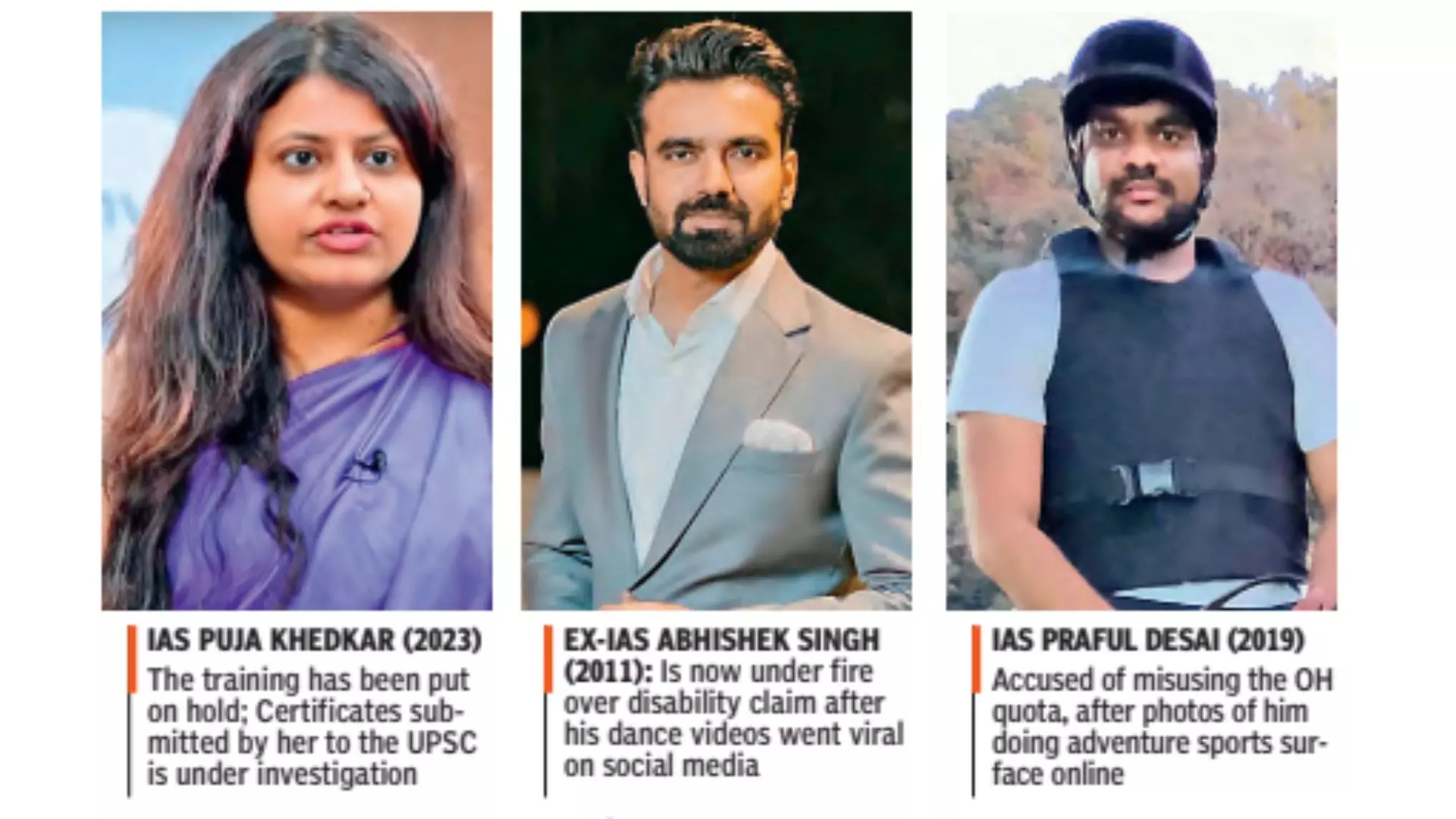True lies

It’s a saga that has all the ingredients of a masala Bollywood movie — which has India, particularly the IAS fraternity, glued to it for the last many days.
As more and more skeletons tumble out of Puja Khedkar’s cupboard — the trainee IAS officer who is in the eye of a storm for her tantrums and alleged forgery — the IAS officers across the country are both shocked and embarrassed.
Puja Khedkar, a 2023 IAS officer, allegedly falsely identified herself as physically challenged and OBC. The IAS trainee was believed to have produced several medical certificates to UPSC. One of the certificates was indicating visual impairment, under the Persons with Benchmark Disabilities (PwBD) provision. However, Khedkar submitted a fitness certificate for admission to a private medical college in 2007, her fitness certificate showed no physical or mental problems, according to reports.
Even as newer details continue to emerge in Puja’s case, social media activists have gone berserk, sharing screenshots of IAS and IPS officers with special category-based candidatures, such as OBC (Non-Creamy Layer) or EWS (Economically Weaker Section). They allege that many officers have made bogus disability claims.
Following Puja, allegations surfaced that Abhishek Singh, a former IAS officer from the 2011 batch, and Praful Desai, an IAS officer from Telangana, had forged disability certificates to secure a reservation in the Union Public Service Commission (UPSC) civil service examination.
Can medical testing be skipped? Can someone fake it?
Jayesh Ranjan, a senior IAS officer, says getting into the higher civil services, such as the IAS or IPS, is a strong ambition, not just for many young people but also for their family members. “It therefore doesn’t surprise me that some people try to game the system unscrupulously. This, of course, requires many people to collude at different levels, but theoretically, it is not impossible,” he says.
At the same time, it is a shame, he says. “I feel very sad that some people have gotten into the services through these kinds of means. Hopefully, the exposure of these individuals will lead to tighter systems, adds Jayesh, currently posted as Special Chief Secretary of the ITE&C and Industries & Commerce Departments of the Government of Telangana.
Senior IAS officer Vikas Raj says, the very fact that questions are being raised about these certificates in so many cases from so many quarters indicates a general lack of trust in their claim.
He says there is a need to create a mechanism to quickly check such counterclaims (if based on valid grounds or papers).
“Also, as a medium- to long-term system improvement, create a mechanism to do some preliminary scrutiny at the time of entry into these jobs and increase transparency, awareness, morality, and internal checks in the entire system that handles this affirmative action,” says Vikas Raj.
Sayeed Omar Jaleel, a senior IAS officer, states that any candidate seeking special privileges or reservations for any category must present a certificate from a competent authority. “This certificate will be verified and scrutinised at the appropriate time when required. No one can fake it. If medical disability is claimed, it can be verified and called upon for testing,” says Jaleel, Secretary of Minorities Welfare Department.
IFS Akhilesh Mishra, Ambassador of India to Ireland, says, “My personal experience dates back to 1989! Then everyone had full faith in the integrity of exams conducted for civil services and various professional courses. Otherwise, some like me, a real frog in the well, born in a very remote village, studied in Hindi-medium schools, could not have made it to BTech, MTech, and IFS.”
Retired IAS officer K. Ratna Prabha says no one can skip medical tests. “Immediately after the personality test, the candidates are allotted to government hospitals to undergo basic tests. Those selected for the IPS have to undergo a specific visual test and height verification,” she says.(Similar to this, tests must cross-check the certificates held in the disability field. “The question of skipping medical tests doesn’t arise,” she adds.
Disability Quota
The UPSC’s disability reservation policy follows the Rights of Persons with Disabilities Act, 2016 and the Government of India’s directives.
It reserves 4% of its vacancies for people with visual, hearing, locomotor, autistic, intellectual, multiple, and intellectual disabilities.
UPSC requires a least 40% disability to use reservation benefits.
Disability Quota
The UPSC’s disability reservation policy follows the Rights of Persons with Disabilities Act, 2016 and the Government of India’s directives.
It reserves 4% of its vacancies for people with visual, hearing, locomotor, autistic, intellectual, multiple, and intellectual disabilities.
UPSC requires a least 40% disability to use reservation benefits.
It therefore doesn’t surprise me that some people try to game the system unscrupulously. This, of course, requires many people to collude at different levels, but theoretically, it is not impossible.” — Jayesh Ranjan, a senior IAS officer
as a medium- to long-term system improvement, create a mechanism to do some preliminary scrutiny at the time of entry into these jobs and increase transparency, awareness, morality, and internal checks. —Vikas Raj, Senior IAS officer
This certificate will be verified and scrutinised at the appropriate time when required. No one can fake it. If medical disability is claimed, it can be verified and called upon for testing —Sayeed Omar Jaleel, senior IAS officer

